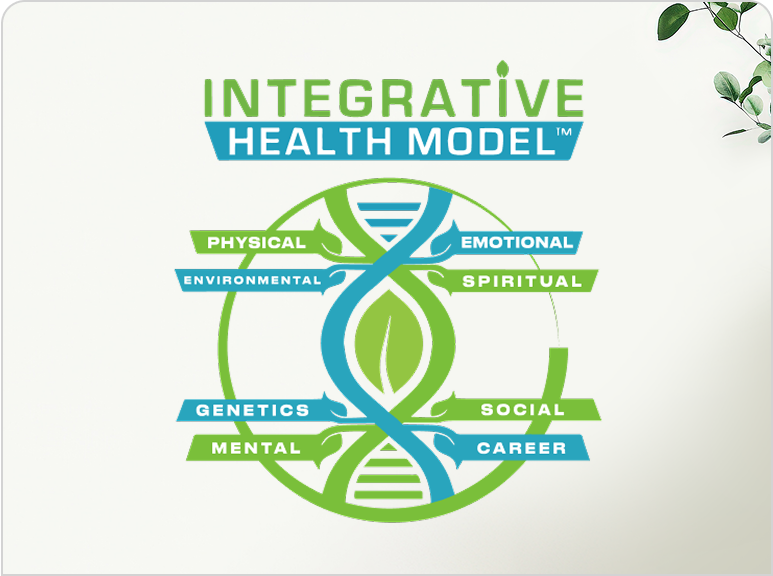Integrative Medicine for Women’s Health

Integrative medicine uses both medical and natural therapies to support women’s health. It focuses on real causes, not just symptoms. Treatments include nutrition, herbs, acupuncture, and stress control. Women use it for hormone issues, cycle health, and menopause. Plans are personal, fact-based, and help long term.
Integrative medicine for women’s health is an innovative and holistic approach that blends conventional medical practices with complementary and alternative therapies. This methodology emphasizes individualized care through a combination of nutritional guidance, botanical medicine, mind-body techniques, and physical therapies. The purpose of integrative medicine is to treat the whole person rather than focusing solely on isolated symptoms or diseases. By considering emotional, mental, spiritual, and physical components, integrative medicine supports overall health and long-term wellbeing. This approach is particularly beneficial for addressing issues such as hormonal imbalances, stress management, premenstrual syndrome, and menopause, among other common health concerns. With increasing interest in personalized health strategies and the limitations of a one size fits-all conventional treatment model, integrative medicine presents a compelling option. Women seeking to optimize health can benefit from a tailored treatment plan that minimizes reliance on pharmaceuticals and instead emphasizes natural healing pathways, iv therapy, and holistic lifestyle modifications. This article delves into the multifaceted nature of integrative women’s healthcare, providing insight into core tenets, therapeutic modalities, holistic approaches to common health issues, and practical guidance for partnering with qualified practitioners. The discussion is supported by scientific research, case studies, and detailed examples that underscore the efficacy of these methods.
Transitioning now into a detailed exploration of integrative approaches, we begin by understanding the core tenets and whole-person focus that form the foundation of successful
in women's health, which often incorporates iv therapy as a supportive modality.
Understanding Integrative Approaches to Female Wellbeing
Integrative approaches to female wellbeing are designed to foster healing by addressing the complex interplay of physical, mental, and emotional factors. The core philosophy behind this approach is that every woman has unique health needs that require a personalized treatment plan. Instead of treating symptoms in isolation, integrative medicine seeks to identify the underlying causes of chronic conditions such as hormonal imbalances, metabolic syndrome, or chronic fatigue. Conventional treatments are combined with complementary therapies like acupuncture, nutritional counseling,
and mind-body practices to create a synergistic effect that enhances overall health.One of the fundamental elements of this approach is the understanding that biological systems are interconnected. For instance, stress can lead to inflammation, which in turn may exacerbate conditions such as menstrual irregularities and polycystic ovary syndrome (PCOS). Research published in the National Center for Complementary and Integrative Health (NCCIH) indicates that integrative therapies can significantly reduce markers of inflammation and improve clinical outcomes in women suffering from chronic conditions. By incorporating dietary supplements, physical therapy, iv therapy, and even yoga into treatment plans, clinicians are able to provide care that supports the body’s natural healing processes.
In addition, integrative care for women emphasizes the importance of patient education and self-care. When women are provided with a better understanding of their own bodies, they are empowered to make informed decisions about lifestyle changes and prevention strategies. The treatment plans often involve detailed nutritional guidance, regular exercise, iv therapy, and stress management techniques such as meditation and mindfulness. These strategies do not merely alleviate symptoms; they also contribute to long-term health improvements by enhancing the body’s adaptive capacity and resilience. Consequently, integrative approaches create a foundation for improved
by nurturing both body and mind.Personalized health plans are built on a foundation of comprehensive evaluations that may include hormonal panels, nutritional assessments, and lifestyle analyses. Such detailed assessments allow practitioners to craft individualized programs that reduce the risk of future illness and enhance overall wellbeing. Integrative medicine also prioritizes an empathetic and collaborative provider-patient relationship, making it easier for women to discuss sensitive issues like menopause or infertility openly. Overall, this holistic strategy not only treats illness but also promotes wellness, making it an paradigm in modern healthcare.
Addressing Common Women's Health Concerns Holistically
Addressing women's health concerns through a holistic lens means treating the root cause rather than merely managing symptoms. Women face a myriad of challenges throughout their lives, from managing hormonal imbalances and menstrual cycle irregularities to navigating the physiological and emotional shifts of perimenopause and menopause. Rather than resorting to conventional treatments that often target single symptoms, integrative medicine employs a comprehensive strategy that combines diet, exercise, stress reduction, and natural therapeutics to correct imbalances within the body.
For instance, managing hormonal imbalances through integrative strategies includes the use of dietary interventions rich in micronutrients, herbal supplements such as chasteberry or black cohosh, and mind-body practices like meditation to reduce stress-induced hormonal fluctuations. Recent peer-reviewed studies have shown that a combined approach using acupuncture, nutritional therapy, and yoga can reduce estrogen dominance a common issue among women experiencing premenstrual syndrome and fibrocystic breast changes. Such findings suggest that when multiple treatment modalities are used together, they can markedly improve the clinical outcomes.
In addition to hormonal issues, many women struggle with menstrual cycle health. An integrative approach offers solutions that include the use of anti-inflammatory diets, nutritional supplements such as omega-3 fatty acids and magnesium, and physical activity to promote balanced blood flow and reduce menstrual discomfort. Furthermore, women seeking support for fertility and reproductive wellness might benefit from targeted nutritional plans, and lifestyle modifications that enhance ovarian function and overall reproductive health.
For women facing the challenges of perimenopause and menopause, integrative therapies can balance declining hormone levels naturally through a combination of botanical medicine, nutrient-dense diets, and physical activity regimens. This holistic framework not only alleviates physical symptoms like hot flashes and joint pain but also addresses psychological symptoms by incorporating stress management techniques and nutritional support to maintain brain health. In cases of disorders such as polycystic ovary syndrome (PCOS) and endometriosis, the integrative approach involves reducing systemic inflammation and improving insulin sensitivity through dietary changes, exercise, and targeted supplements. Such comprehensive care has the dual effect of alleviating symptomatic discomfort while also fostering long-term health benefits.
Overall, a holistic view on women's health recognizes the interconnection between various physiological processes and tailors treatments that support the entire system. By combining conventional medicine with complementary therapies, women can achieve more balanced outcomes, reduce dependency on pharmaceuticals, and improve overall quality of life. This approach creates a dynamic treatment environment that adapts over time, ensuring that care remains effective even as a woman’s health needs evolve.
Key Therapeutic Modalities in Integrative Medicine for Women’s Health
The therapeutic modalities in integrative medicine are as varied as the conditions they aim to treat. For women seeking comprehensive health solutions, the modalities often include nutritional guidance, botanical medicine, acupuncture, and mind-body practices, all of which work together to promote optimal physiological function and emotional balance.
Nutritional guidance is essential in achieving optimal female physiological function. An integrative practitioner typically starts with a thorough dietary analysis to identify micronutrient deficiencies or allergic reactions that may be affecting a patient's overall energy levels and hormonal balance. For example, a dietitian may recommend a balanced intake of vitamins, minerals, and healthy fats to support metabolism and reduce inflammation, which is particularly beneficial for managing premenstrual syndrome and menopausal symptoms. The incorporation of a healthy diet can also promote tissue repair and reduce the risk of chronic diseases such as metabolic syndrome and cardiovascular conditions.
The role of botanical medicine in women’s wellness programs cannot be overstated. Herbal remedies have been used for centuries to treat menstrual irregularities, insomnia, and stress-related disorders. Modern research supports these traditional uses; studies have shown that compounds found in herbs such as dong quai and turmeric possess anti-inflammatory and antioxidant properties that support hormonal balance and protect nerve function. Botanical medicine also underpins the development of dietary supplements that provide targeted support for women’s health, complementing the effects of a nutrient-rich diet.
Acupuncture and Traditional Chinese Medicine (TCM) offer additional therapeutic benefits by stimulating the body's self-healing mechanisms. Many women have reported significant improvements in pain management and sleep quality after undergoing acupuncture sessions, which work by balancing the central nervous system and promoting blood flow to tissues under stress. TCM also integrates the use of moxibustion and cupping, which have been shown in clinical studies to reduce stress-related symptoms and enhance overall vitality.
Mind-body practices form a critical component of integrative therapy. Techniques such as meditation, yoga, and deep-massage therapy have been proven to reduce cortisol levels and improve mental clarity, which helps manage stress-induced ailments including anxiety and depression. Research published in peer-reviewed journals demonstrates that regular practice of yoga can improve both mood and physical stamina by enhancing oxygen flow and reducing inflammatory markers. These practices support emotional resilience, enabling women to better manage the psychological aspects of chronic health conditions.
Movement therapies, including gentle forms of exercise tailored to women’s needs, are incorporated to promote physical vitality and resilience. Programs often recommend low-impact exercises such as Tai Chi or Pilates, which enhance core strength, balance, and flexibility, thus reducing the risk of injury and enhancing mobility. Together, these therapeutic modalities not only offer symptomatic relief but also support long-term health maintenance by addressing potential disease roots from multiple angles.
Benefits of Choosing Integrative Medicine for Her Health Journey
Choosing integrative medicine as a primary approach for women's health has numerous benefits that extend beyond immediate symptom relief. This model of care provides more personalized treatment plans, reaches deeper into the underlying causes of conditions, and ultimately empowers women to take charge of their overall wellbeing. One of the foremost benefits is better symptom management. Integrative strategies often lead to marked improvements in issues ranging from fatigue and insomnia to chronic pain and hormonal imbalances, reducing the reliance on pharmaceuticals that traditionally come with a range of side effects.
The comprehensive nature of integrative care also fosters greater overall wellbeing, energy, and quality of life. By incorporating nutritional guidance, physician-led evaluations, and complementary therapies such as acupuncture and yoga, patients can experience enhanced immune system function and improved levels of physical activity. In particular, the use of iv vitamin therapy and nutrient injections can rapidly replenish essential vitamins and micronutrients, supporting metabolic function and accelerating detoxification processes. These interventions are especially valuable in addressing widespread conditions like metabolic syndrome and chronic fatigue, resulting in improved tissue repair and better blood flow.
Empowerment is another key benefit. Integrative medicine encourages women to be proactive about their own health by actively participating in their treatment plans. When patients work collaboratively with their healthcare providers, they gain invaluable insight into managing conditions such as premenstrual syndrome, menopause, and stress-induced illnesses through lifestyle modifications and robust self-care practices. This empowerment extends to long-term health maintenance, reducing the risk of disease progression through early intervention and preventive measures.
Furthermore, integrative medicine is effective in reducing potential side effects and dependency on conventional drugs. By adopting a natural approach to healing, women are less likely to experience the unwanted consequences typically associated with long-term medication use. This is vital in managing chronic conditions where pharmaceutical interventions might otherwise lead to issues such as gastrointestinal disturbances, hormonal disruptions, or adverse reactions that impair nutrient absorption.
Financially, while the initial investments in integrative therapies may appear higher, the long-term benefits include reduced healthcare costs due to consistent improvements in well-being and lower incidences of emergency care. Studies have indicated that patients engaged in integrative programs often report not only a reduction in acute symptoms but also a sustained improvement in overall life satisfaction over time. This holistic methodology shapes a proactive health journey that not only alleviates current health concerns but also fortifies the body against future stressors, promoting enduring resilience and vitality.
Finding and Partnering With an Integrative Women's Health Practitioner
Finding a qualified integrative women’s health practitioner is a crucial step in this holistic health journey. Selecting the right practitioner ensures that the treatment plan is tailored to individual needs and that it incorporates both conventional and complementary therapeutic modalities. To begin with, it is important for women to identify practitioners who are board-certified and experienced in both conventional medicine and integrative therapies. A well-qualified provider will have credentials and training that relate directly to family medicine, nutrition, and holistic medicine, ensuring that they are well-versed in addressing conditions such as menopause, infertility, and hormonal imbalances.
During the initial consultation, patients should expect a comprehensive evaluation that goes beyond standard physical exams. This typically includes detailed assessments of dietary habits, lifestyle factors, stress levels, and any previous interventions. The practitioner will likely perform advanced testing, including hormone panels and nutritional assessments, to determine the root causes of the patient’s symptoms. With this information in hand, an integrative practitioner's goal is to develop a personalized health plan that may include components like iv vitamin therapy, acupuncture, dietary supplements, and physical therapy modalities such as yoga or resistance training.
Creating a collaborative and supportive care team is also emphasized within integrative medicine. Women are encouraged to participate in the creation of their care plans by asking pertinent questions such as, “How does this treatment work?” and “What are the expected outcomes over time?” Open communication is essential for tailoring treatments and ensuring that patients are comfortable with the therapeutic approaches being used. This transparent dialogue allows for adjustments based on progress or any changes in health status, making the process dynamic and adaptable.
Furthermore, experienced practitioners often provide valuable education on the science behind integrative therapies. For example, they may explain how mechanisms like acupuncture stimulate the nervous system or how nutritional interventions can improve neurotransmitter synthesis and digestive health. Information on the cutting-edge research from institutions such as the National Center for Complementary and Integrative Health is shared to reinforce treatment choices. This evidence-based approach not only builds trust between the patient and provider but also strengthens the patient’s commitment to the regimen.
In addition, women should consider the logistical aspects, such as the clinic location, accessibility, and the range of services offered. Many clinics, such as Cutler Integrative Medicine, provide comprehensive suites of services from homeopathy and genetic screening to nutrient injections and iv boosters ensuring that all aspects of health can be addressed under one roof. This continuity of care simplifies the management of health and maximizes the benefits of integrative medicine. By fostering a supportive and collaborative partnership, women can achieve optimal health outcomes and build resilience against future health challenges.
Integrative Medicine Tailored to a Woman's Lifespan
Integrative medicine offers a uniquely adaptable framework that caters to the evolving health needs of women at every stage of life. From adolescence to post-menopause, women face distinct physical and emotional changes that require customized care strategies. During adolescence and early adulthood, the focus is primarily on establishing a strong foundation of health through education, nutrition, and active lifestyle choices. Young women are encouraged to integrate practices like yoga, balanced diets, and regular physical therapy sessions to support bone density, hormonal balance, and mental clarity. In these formative years, preventive measures are emphasized to prepare the body for the changes that will come later in life.
For women during pregnancy and the postpartum phases, integrative medicine addresses both the physical demands of childbirth and the significant emotional adjustments that follow. Holistic approaches during these periods often include nutritional counseling to manage weight and provide essential nutrients for both mother and baby, as well as complementary therapies like acupuncture to alleviate common discomforts such as back pain or nausea. Mind-body practices such as meditation and stress management techniques are taught to promote mental resilience and enhance maternal bonding. Some practitioners offer innovative solutions like IV vitamin therapy to rapidly replenish lost nutrients and restore energy levels, which is critical during the postpartum recovery phase. These programs also cover breastfeeding support, sleep optimization, and the management of postpartum depression—ensuring that both physical and emotional needs are comprehensively met.
As women transition into midlife and later years, the focus shifts to maintaining vitality, managing chronic conditions, and preventing age-related diseases. Integrative modalities such as nutritional therapy support hormonal balance during perimenopause and menopause, reducing symptoms like hot flashes and mood swings. Botanical medicines and dietary supplements play a pivotal role in managing the gradual decline of estrogen and other hormones, thereby enhancing tissue health and nerve function. Moreover, innovative treatments like IV boosters are becoming increasingly popular to counter fatigue and support recovery after physical exertion. Movement therapies, which might include low-impact exercises such as Pilates and tai chi, help preserve flexibility and balance while reducing joint pain and stiffness. These physical therapies are often complemented by dietary strategies that optimize metabolic function and support a healthy weight, which is critical for the prevention of metabolic syndrome and other age-related conditions.
Throughout the lifespan, integrative medicine emphasizes ongoing education and active participation. Women are encouraged to regularly reassess their health goals, work with their practitioners to refine treatment strategies, and adopt sustainable lifestyle changes. This proactive approach not only addresses immediate health concerns but also lays the foundation for long-term wellbeing. It promotes a dynamic relationship between patient and provider, where treatments evolve based on changing health needs and lifestyle factors. In essence, integrative medicine transforms the traditional model of healthcare from reactive to proactive, ensuring that women are supported at every phase from adolescence and early adulthood through pregnancy and into senior years.
Proactive Wellness and Prevention With Integrative Medicine for Women’s Health
Proactive wellness and prevention are at the heart of integrative medicine, empowering women to take charge of their health before chronic issues arise. This comprehensive approach centers on cultivating mental, physical, and emotional fortitude through sustainable practices that address stress, nutrition, sleep, and detoxification. By consistently engaging in preventive measures, women can significantly reduce their vulnerability to common health issues such as metabolic syndrome, hormonal imbalances, and immune dysfunction.
One essential component of proactive wellness is stress management. Chronic stress has been linked to a host of issues including insulin resistance, weight gain, and impaired immune function. Integrative medicine advocates for mind-body practices such as yoga, meditation, and deep breathing exercises which have been widely demonstrated in peer-reviewed studies to lower cortisol levels and enhance mental clarity. For instance, research from the Journal of Alternative and Complementary Medicine has documented a 20% reduction in stress markers among women who practiced regular meditation. These practices also promote better sleep quality, an important factor in maintaining a robust immune system and supporting tissue repair.
Another proactive strategy involves optimizing digestive health, which is fundamental to systemic balance in women. A healthy gut microbiome is vital for nutrient absorption, hormonal regulation, and immune system support. Integrative approaches may include dietary adjustments to incorporate probiotics and prebiotics, thereby improving gut health and combating digestive issues that often underlie systemic imbalances. Furthermore, natural detoxification pathways that support liver function and enhance metabolic processes are promoted through herbal supplements and nutritional strategies. These interventions help to eliminate toxins that contribute to fatigue and chronic inflammation.
Enhancing sleep quality in equally critical. Poor sleep has been associated with increased risks of chronic diseases and diminished cognitive function. Integrative medicine offers solutions that include natural sleep aids such as magnesium supplements, melatonin, and behavioral interventions that improve sleep hygiene. By addressing insomnia and other sleep disturbances through non-pharmaceutical means, women can achieve restorative sleep that contributes to overall energy levels and immune support.
In addition, adopting a healthy lifestyle through regular physical activity is emphasized. Exercise, whether through structured physical therapy sessions or through engaging activities like yoga and Pilates, promotes cardiovascular health, aids in weight management, and enhances overall mood. Movement therapies are integral in maintaining muscle strength, reducing pain, and elevating mental wellbeing. This holistic framework is supported by clinical evidence that points to a significant reduction in disease symptoms and improvement in quality of life when multiple wellness strategies are employed in tandem.
Overall, integrative medicine fosters a proactive approach where the focus is not merely on treating illness, but on preventing it through sustained healthy behaviors. Women who commit to these practices experience improved energy, reduced fatigue, and a higher quality of life. The synergy between nutritional support, holistic stress management, and regular physical activity creates an environment in which the body can heal and maintain balance naturally. This comprehensive strategy minimizes future health risks and ensures that wellness becomes a continuous, self-sustaining journey.
Frequently Asked Questions
What is integrative medicine for women’s health?
Integrative medicine for women’s health combines conventional medicine with complementary therapies like nutrition, acupuncture, and mind-body practices to treat the whole person. This approach focuses on personalized care that addresses both the underlying causes of health issues and their symptoms, empowering women to achieve overall well-being.
How does integrative medicine manage hormonal imbalances?
Integrative medicine addresses hormonal imbalances by combining dietary modifications, nutritional supplements, and alternative therapies such as acupuncture. These personalized interventions help regulate hormone levels naturally, reducing symptoms like mood swings and premenstrual syndrome while improving overall metabolic function.
What types of therapies are used in integrative women's health?
Common therapies include nutritional guidance, botanical medicine, acupuncture, yoga, and physical therapy. These complementary treatments work together to improve immune function, reduce chronic stress, manage pain, and support healthy weight management while promoting overall resilience.
Can integrative medicine help with preventive care in women?
Yes, integrative medicine emphasizes proactive wellness approaches, including stress management, optimized nutrition, regular exercise, and improved sleep quality. These strategies help prevent chronic conditions and support long-term health by addressing the root causes of disease before they become problematic.
How do I choose the right integrative medicine practitioner?
It is important to look for practitioners who are board-certified, have a dual background in conventional and integrative therapies, and offer personalized evaluations. Women should schedule an initial consultation to discuss their medical history, treatment options, and ensure that there is good communication and mutual trust.
Is integrative medicine effective during menopause?
Integrative medicine can be particularly effective during menopause by alleviating symptoms such as hot flashes, mood swings, and fatigue through the use of natural supplements, botanical treatments, dietary adjustments, and stress reduction techniques. This holistic approach not only improves immediate symptoms but also supports long-term hormonal balance and overall vitality.
Are there scientific studies supporting integrative medicine for women?
Yes, numerous peer-reviewed studies support the efficacy of integrative therapies. For example, research published in the Journal of Alternative and Complementary Medicine has shown that regular meditation and yoga practice can significantly reduce stress markers and improve sleep quality, further validating the benefits of integrative approaches.
Final Thoughts
Integrative medicine for women’s health represents a paradigm shift towards a more personalized and holistic approach to care. By merging conventional methods with complementary therapies, this practice addresses the full spectrum of women’s health challenges across the lifespan. From managing hormonal imbalances to incorporating proactive wellness strategies, integrative care empowers women to take charge of their well-being naturally and effectively. Embracing these comprehensive health solutions ensures a balanced, resilient, and vibrant life.
You May Also Like




.png)

.png)



%201.png)



.png)

.png)



.png)
.png)
.png)
.png)
.png)
.png)
.png)
.png)

.png)
.png)
.png)
.png)

.png)
.png)

.png)
.png)






.png)




.png)
.png)
.png)

.png)

.png)